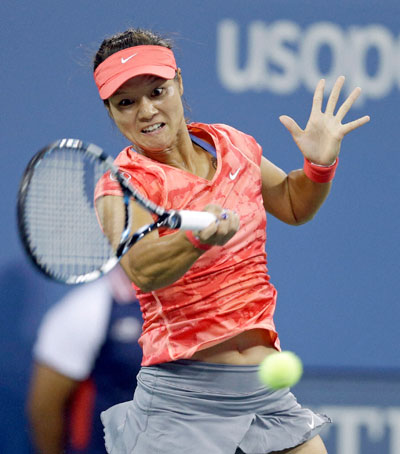 NEW YORK: China’s Li Na made a triumphant night-time debut on Sunday at the US Open with an impressive rout of former world number one Jelena Jankovic to reach the quarterfinals and match her best New York result.
NEW YORK: China’s Li Na made a triumphant night-time debut on Sunday at the US Open with an impressive rout of former world number one Jelena Jankovic to reach the quarterfinals and match her best New York result.
But tournament organizers take note — she would rather be playing in the daytime, thank you very much.
Fifth seed Li, the 2011 French Open champion, needed only 57 minutes to defeat Serbian ninth seed Jankovic 6-3, 6-0 and book a last-eight date against Russian 24th seed Ekaterina Makarova.
And she did it under the lights in the last match of the night at Arthur Ashe Stadium, where the show and entertainment aspects swirl with the tennis to produce a unique, noisy environment.
“I like first match because after first match, you have whole day,” Li said. “Not like night session. For night session you have to wait the whole day and play in the night. But after winning the match I was feeling OK, just a little bit late.”
Li, who would have loved to have had most of the day off for rest or shopping in Manhattan, got into the spirit of the night by putting on her own version of an off-Broadway show, refusing to let Jankovic see any sign of nervousness or weakness even though she felt both at times.
“I was a little bit showtime because I didn’t want to show how nervous I was,” Li said. “It’s not all about technique. It’s about body language. I don’t want to show opponent how week I am. I want to show how strong I am.”
She did that, excitedly saying after the match it might have been the best of her life, although she was also asked before the crowd about such things as her breakfast meal, of which she said, “I can’t give away my secret.”
“I was really happy with the way I was playing on the court. I was trying to serve-volley, also trying to come to the net to win the points fast.”
It’s part of Li’s strategy to make a jump from being among the top five players in the world to becoming the very best.
“If I didn’t change (tactics), I know I can stay in the top 10 but I want to make another level,” she said.
Helping make Li’s day even more difficult was her inability to watch the matches on television because some New York cable television providers are not showing the network that telecasts the US Open to most of the country in a dispute over rights fees.
“Today they didn’t show on TV,” Li said. “I turn on the TV, try to see some matches, but they didn’t show.”
Li was asked how many people in China might watch her play Makarova. “Not many,” she said. “Maybe a couple million.”
